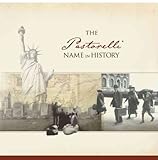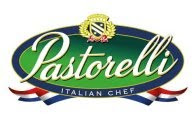Parliamo degli anni 1850, da Amedeo Pastorelli che faceva il postino a Lucoli scaturì un’idea imprenditoriale vincente che ha trasformato il cognome ed il marchio PASTORELLI in uno dei più importanti di Chicago.


Amedeo facendo il postino si imbatteva in molti paesani che si recavano all’ufficio postale per ricevere o spedire generi alimentari. Ebbe l’idea geniale di immagazzinare alcuni di quei prodotti alimentari locali, soprattutto forme di formaggio pecorino, per ricercare acquirenti nella grande distribuzione. Conservava tutto in una cantina e cominciò a rivendere, dapprima in zone vicine. Amedeo ebbe quattro figlie e un figlio di nome Benedetto nato nel 1871. Il figlio Benedetto era ambizioso, amava i libri e l’apprendimento. Sognava le nuove terre lontane: l’America e le grandi opportunità che si aprirono alla fine del XIX secolo. Morto Amedeo Pastorelli, suo figlio iniziò a spedire, soprattutto formaggio pecorino degli armenti locali, in America dove gli immigrati non volevano altro che ritrovare i sapori e i gusti della loro terra. E’ così che nacque l’import-export Pastorelli. Benedetto viaggiava in continuazione per approvvigionare il magazzino da casa sua verso l’America, dove concludeva gli affari. Benedetto ebbe due figli, Leandro e Mario, la moglie Aurora era insegnante di scuola, con l’approssimarsi dello scoppio della prima guerra mondiale si trasferirono tutti in America. Da questo momento iniziarono a sostituire i cibi prodotti in Italia con alcuni prodotti in America e così cominciarono a produrre il concentrato di pomodoro. Lo stabilimento di produzione nacque nel 1917 in California.
Nel 1924 tutta la famiglia Pastorelli era in California. La produzione e la distribuzione di concentrato di pomodoro in scatola e altri prodotti era agli inizi. L’olio d’oliva cominciava ad essere apprezzato dai consumatori americani e a Leandro, figlio di Benedetto, venne data la responsabilità di erigere un nuovo stabilimento di produzione di olio di oliva, il primo in America, a Lindsay, California. Fu una grande sfida per questo giovane. L’azienda ha continuamente progredito: Robert Pastorelli, figlio di Leandro, ha rappresentato la quarta generazione fino alla sua morte avvenuta il 25 gennaio, 2000. Oggi, suo figlio Richard Pastorelli continua l’attività di famiglia. Da Lucoli si sono originate e sviluppate cinque generazioni di imprenditori vincenti.
Dove si trova l’azienda: 901 W Lake Street. Chicago, IL 60607. Ha un fatturato di 390 milioni di Euro.
|
We thank the Pastorelli Company for being able to reconstruct reading your site a part of the history of Lucoli.
 |
| alcuni dei prodotti della Società Pastorelli
|
Pastorelli’s Story a family from Lucoli (AQ)
 |
It all started during the reunification of Italy about 1850. . .
Nestled in the heart of the rugged Appennine Mountains in Central Italy, fifty miles Northeast of Rome, the Pastorelli family started a primitive but efficient food distribution business.
Amedeo Pastorelli was the postmaster of the town of Lucoli, L’Aquila. Farmers, peasants, professionals, and others came to his small post office building to pick up mail and to make small shipments of home-produced food products. So wise, young Amedeo figured, “Why don’t I stock some of those products that the people in the outlying areas produce and perhaps I will find large buyers by accumulating stocks of cheese, olive oil, nuts, and other local products.”
In an old subterranean cellar, the now world famous Pecorino Romano cheese was stored for aging, rubbed occasionally with locally produced olive oil, mixed with small amounts of black ground pepper and domestically produced wine vinegar. The enterprise became very successful as the small sheep-raising families would produce only a dozen loaves of cheese per week, but instead of their curing it for six months, they could get supplies from Amedeo in payment of their cheese. They would take back up the mountain items such as olive oil, refilling their goat skin containers, which were weighed on a primitive scale and hauled away on the backs of their rugged mules. The local wines were filled into straw-covered glass demijohns, also strapped on the opposite side of the mule’s packs. The straw covering the demijohns would be soaked with water so that the wine remained cool during the trip.
Amedeo had four daughters and one son named Benedetto born in 1871. He was raised in the environment of the primitive business activities. Young Benedetto was ambitious; he loved books and learning. He dreamed of far away new lands like America and the great opportunities open in the late nineteenth century.
At the passing of Amedeo Pastorelli, his ambitious son started to ship some of the stored cheese to America where the immigrants longed for the flavors and tastes of their homeland.
So the Pastorelli import-export business was born. Benedetto traveled between the supplies in his home warehouse and America, where he exchanged cheese, olive oil, salami, etc. for America’s manufactured products much in demand back home.
The Pastorelli business thrived for years while his new school teacher bride started a family raising two sons, Leandro and Mario, who dreamed of joining their father in great business adventures.
Soon European rivalries and intrigues became very worrisome and Aurora, the restless school teacher, felt that a war was about to begin, and she and her traveling husband would be separated for many years. So she packed her personal belongings, and with her two young sons, headed for distant America to join Benedetto, who by that time was establishing a productive food business.
The next decade in America saw the replacement of some original Italian foods by American-produced copies. Tomato paste was one of these fine old world food products which was targeted for reproduction; so Benedetto Pastorelli, together with others willing to risk some capital, started to produce 6oz. tomato paste under the Contadina® Brand. The first location in upper New York State did not work out very well, so he headed for California. This venture began in 1917; and in 1919 Benedetto’s son Leandro, better known as Andy, visited the new San Jose, California plant being constructed, and the bug bit him very hard!
By 1924 the whole Pastorelli family was in California. The production and distribution of canned tomato paste and other products was in its infancy. Since olive oil was now being accepted by the American public, Leandro was assigned the responsibility of erecting a new olive oil producing plant, the first in America, at Lindsay, California. It was a great challenge for this young man, and the reason he got the job was twofold: He could read Italian and Spanish blueprints and in his higher education he had been taught the use of the metric system.
Thus, the first and finest olive oil was offered and readily accepted for its mild, nutty flavor; virgin in reality not in name only. But Benedetto Pastorelli, in his continuously reaching out for better relations between his beloved Italy and his new-found American business love, soon made a bid to purchase the old Garibaldi Company which handled high grade foreign products. He wired his son Leandro to return within ten days to take over the new acquisition in Chicago.
This was in 1926 and since imported products were becoming quite expensive, Leandro concentrated on domestic production. Seeds of the Italian pepperoncini were brought in from Toscany and planted locally. Unfortunately the harvested crop was fiery hot, not mild like the Toscany peppers. San Marzano tomato seeds from the famous tomatoes grown on the southern exposure of Mt.Vesuvius were planted by Leandro’s farmer friends in Indiana. Surprisingly, they responded well to the soil and the climate, but again an obstacle. The tomato vines had to be poled up, hard and tedious work which local farmers refused to accept. The problem now became how to obtain the pectin, the solids, and the flavor of the crop and keep them on the ground. A canner friend at John Mitchell Company was intrigued and offered to help. More San Marzano seeds were produced and bred with local varieties, and after some intelligent guidance by Leandro Pastorelli, the fantastic Roma variety of tomatoes was born.
Leandro wanted to keep the results as private as possible, so he sent a packet of the new hybrid seeds to Morocco. The owner of the land in Morocco was an Italian whom Leandro had met in Naples. Through his new brides recently received dowry, the owner took possession of a huge tract of virgin land in Morocco from the Rothchild family of which she was a member. This young bridegroom was enthusiastic about the new venture and in two seasons produced tomatoes, tomato paste and dehydrated tomatoes in sizeable quantities at surprisingly low costs.
Other tomato products were packed under the Regina label, mostly from Italy and Spain, but supplies and prices were erratic. It became quite evident that the Pastorelli sources again would be aimed at California.
Both the Pastorelli and Gangi families had sold their interest in the Contadina® Canning Company. As the war ended, two of the Gangi sons returned to civilian life. Their desire to reenter the canning industry was considered. After much planning the two families decided that a joint venture was logical.
Before long the property, the used equipment, etc. were set up. The brand was naturally Regina which was now well-accepted with the trade. Financial and distribution arrangements were made and as the Gangi boys produced, the Pastorelli brothers sold and distributed all the usual standard products that the small plant could pack.
Soon Leandro (Andy), again looking in the future, noticed that the war brides would not leave their newfound jobs, and prepared foods seemed to interest them. Why make sauces from tomato paste with the hours of kitchen work involved? So, again Leandro, with help from his sister Mary DiStefano and brother Mario, created prepared Italian Chef sauce, Fully-prepared Pizza Sauce, Spaghetti Sauce and a special sauce with wine under the Continental Brand.It all started during the reunification of Italy about 1850. . . Nestled in the heart of the rugged Appennine Mountains in Central Italy, fifty miles Northeast of Rome, the Pastorelli family started a primitive but efficient food distribution business. They were all immediate successes, offered only in consumer sized cans.
Years later other national brands developed, but none with the high quality of the Pastorelli products. Demand increased and soon, because of the expansion of the pizza production industry, the foodservice sizes were born in No.10 tins. The motto was born, “If Mother Nature does not produce it, Papa Pastorelli will not use it.”
Only the best and purest ingredients go into our sauces. This means no fillers, no starches, and no preservatives. The hybrid tomatoes harvested at peak ripeness, crushed and canned within hours of harvest, assure us of our desired top quality.
Other awards for Pastorelli products, all entered and judged in World Class competition, were received strictly on merits judged by the very discriminating Monde World Selection organization. They include Gold Medals in; Paris(1979), Vienna(1980), Amsterdam(1981), Rome(1995), Lisbon(1996) and Brussels(1997).
Pastorelli Italian Chef Pizza Sauce was awarded the world renowned Monde Selection gold medal in 1979, 1980, 1995 and 1997.
Pastorelli Italian Chef Spaghetti Sauce was awarded the Monde Selection gold medal in 1981.
The results of these gratifying experiences have been very rewarding to Pastorelli. Robert Pastorelli, Leandro’s son, represented the fourth generation until he passed January 25, 2000. Robert took after his father, a hard worker and very dedicated to running the family business. Today, his son Richard Pastorelli continues the family business. All are here to serve the expanding new industry like their ancestors.

